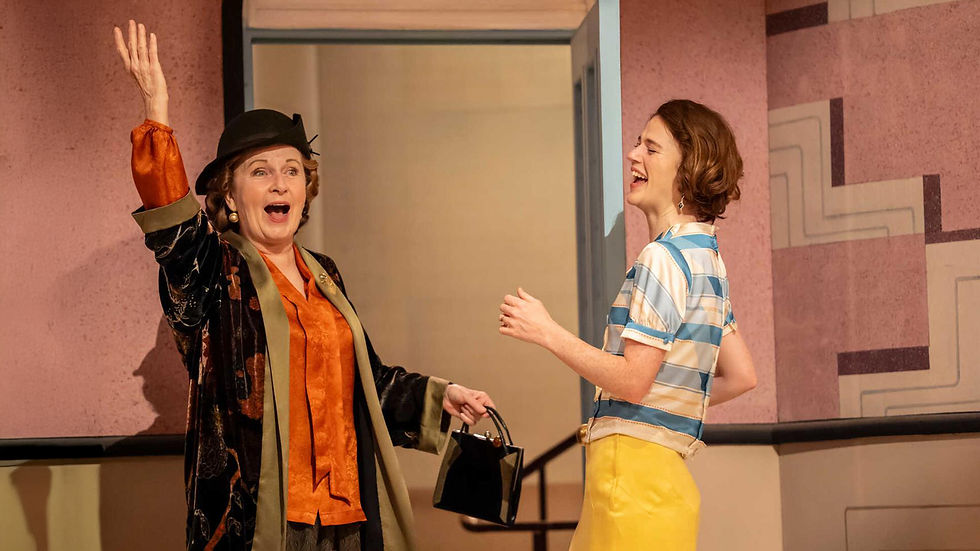The Constant Wife - RSC Review
- Thomas Levi

- Jul 11, 2025
- 3 min read
★★★★☆
Perched neatly between being a charming comedy and clever farce, the RSC’s revival of The Constant Wife at the Swan Theatre delivers a consistently playful and self-aware comedy. It’s light on its feet and full of wicked wit—but as the minutes tick on, you might find yourself wondering: haven’t they made this point three times already?

Set in 1920s Harley Street, Somerset Maugham’s original play follows Constance Middleton, a stylish and astute wife who appears blissfully unaware that her husband, John, is having an affair with her best friend, Marie-Louise. As whispers swirl and family members clumsily try to shield her from the truth, Constance reveals she has known all along. Rather than respond with outrage, she turns the situation on its head, asserting her independence with a cool logic that unsettles the men around her. What follows is a witty and provocative exploration of marriage, money, and the performance of womanhood, all wrapped in the crisp folds of a period comedy that feels surprisingly modern.
Rose Leslie is wonderful as Constance. She weaves charisma, elegance, and quiet steel into a performance that anchors the play. Her knack for shifting between societal poise and simmering resolve gives the character an appealing modern sensibility. Leslie draws us into Constance’s world and holds us there. Whilst there is little in the way of character arc, the reveal of her power and self-control is quite captivating.
Kate Burton delivers a laugh-out-loud performance as Mrs Culver, Constance’s bold and opinionated mother. Her comic timing is impeccable, bringing a delightful exaggeration to every line. Luke Norris matches her campy energy as John Middleton, the roguishly charming husband. His contorted expressions and voice lend the perfect farcical edge to what could otherwise be a straight-laced marital betrayal. Many of the biggest laughs of the night are courtesy of Burton and Norris, whose comedic extravagance pays off nicely.

This revival is writer Laura Wade’s reimagining of the 1926 original. She trims the cast, reorders scenes for greater clarity, and injects smart, contemporary humour, without overshadowing Maugham’s wit. Notably, Jamie Cullum’s original jazz-inspired soundtrack adds a fresh, jaunty energy to the play; even if its appearance is limited, it certainly helps set the time of the piece.
Amy Morgan and Mark Meadows bring grounded warmth to the stage as Martha Culver and Bentley. Morgan’s portrayal of Constance’s sister is both witty and emotionally astute, while Meadows' Bentley, more than a mere servant, is a subtle moral compass in the household. Their interplay helps anchor the farce in human truth. Although their realistic characters are juxtaposed with the more caricature performances, which somewhat blur the play's genre.
Raj Bajaj and Emma McDonald sparkle as Bernard and Marie‑Louise: vivid, fun characters who brighten the stage, if only the script had given them more space to grow. Their performances hint at complexity beneath the glamour, and one wishes for deeper character arcs for the actors to explore. As it is, they are fantastic portrayals of one-dimensional characters.

While the first half thrills with its mix of sharp humour and feminist subtext, the second half lingers too long on its themes. By the time the speech about men’s and women’s “needs” repeats itself a third time, it's clear the point has been made… and then some. Act II occasionally feels like a protracted echo of Act I’s cleverness. The last 20 minutes of the play could have been shaved, and it wouldn’t have had any effect on the narrative.
Whilst this review highlights a few negative quibbles, they amount to a very small dent in what is otherwise a very funny and enjoyable piece of theatre. The Constant Wife may not be the show on everyone's lips, but the auditorium was filled with laughter and rapturous applause throughout the performance — as light-hearted comedies go, this very much scratches an itch.
The set design is clever: peeling wallpaper, changing fixtures, and shifting furnishings signal flashbacks. Costumes by Anna Fleischle and Cat Fuller are pure 1920s charm, bright, stylish, and often hilarious. Director Tamara Harvey ties it all together with confidence, highlighting wit without cluttering it with spectacle.
Despite its breezy tone and self-awareness, The Constant Wife retains an emotional bite. It is, at its heart, a character study, one that explores marriage, power, and female agency with charm and intelligence. It isn't reinventing the wheel, but for those craving a genuinely funny comedy with substance, this is exactly the treat.





















































Comments